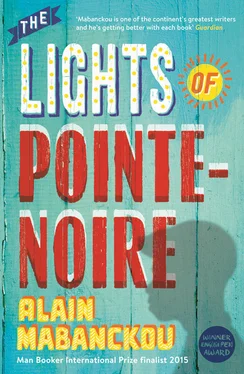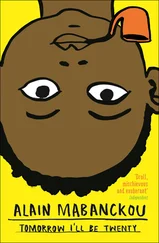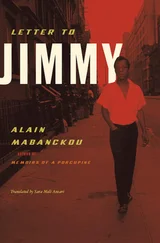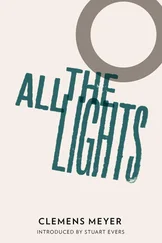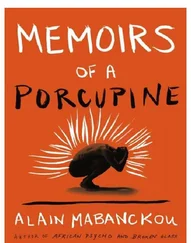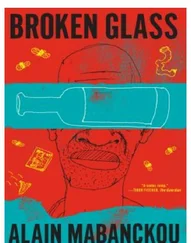I have no wish to track down the painter of this Congolese picture. I will settle for what Eric Miclet told me: if something blends into the background, let it be…
Each time I go up the stairs in the Institute I remember how I used to climb them when I was only twelve years old, and there was nothing up there but books and readers from the remotest districts of Pointe-Noire. Since that time there’s been a lot of building work, and I still can’t find my way around. The old theatre has gone, and a new performance area has been created at the rear of the building. Young people arrive in the morning at the cyberspace in the basement, and don’t leave again until closing time.
This used to be the only library in the whole town, with a children’s books section which we made great use of. I’d put myself in a corner, near the window, and lose myself in comic strips whose heroes were trapped in this room, unable to leave and have new adventures because we wouldn’t let them out, for fear they’d go and bewitch other children, in a different country. For us they were living people, of flesh and blood. We entered the premises with the sense that we were leaving Pointe-Noire for a long journey through a fantasy world where we were held captive. Was there a single one among us who didn’t take on the names of our heroes, and act like them? Take Sosthène, for example, a muscular young man from the Rex district. He worshipped Tarzan so much, he adopted his name, but we knew he wasn’t the real one because every time he tried to swing from branch to branch he fell and limped for the next three days. Zembla was much more like us, we found his name ‘very African’, compared to Tintin or Blek le Roc. We were particularly fond of his friends Rasmus, Pétoulet, Tabuka, Satanas, Bwana and especially Yéyé, a black child, like us. We didn’t want anything bad to happen to him. The useless conjuror, Rasmus, had us doubled up with laughter. When his magic tricks went wrong we felt sorry for him and hoped that some day or other he would become the greatest magician in the world. Many of Zembla’s friends were animals — which we found reassuring, as we believed animals had souls, that they were the origin of the human species, and that each of us had an animal double hidden somewhere in the forest. We were amazed by Pétoulet, the kangaroo, as there was no such animal in our country, it came from a continent we couldn’t find on the world map pinned up on the classroom wall. For this reason Pétoulet was our favourite of all the wild creatures. The lion and the panther were carnivores. Pétoulet, on the other hand, was what nowadays would be called a vegetarian. But he still had to go hunting, to feed all Zembla’s animal friends, especially that greedy Satanas.
The lion, Bwana, terrified us, though he was less wicked than in our traditional stories, where he was a carnivore who ate up all the children until finally the smallest of them all, aided by the spirits of the forest, managed to slay him. The name Bwana — which featured in Tarzan too — meaning ‘master’ in Swahili, was not offensive to us, even though it later came to symbolise submission, domination.
I didn’t realise that in the library you could read whatever you felt like reading, picking things randomly off the shelf. I worked my way through in alphabetical order, starting to read the authors of French classical literature, beginning with ‘A’. Alain-Fournier was there, with Le Grand Meaulnes . Jean Anouilh with Antigone . Guillaume Apollinaire, whose only work of any interest to me was Le Pont Mirabeau . Similarly with Louis Aragon, I read only Les Yeux d’Elsa from the collection of the same title. I remember I skipped Antonin Artaud and Marguerite Audoux, and went quickly on to Marcel Aymé and The Wonderful Farm — I loved the cat who could make it rain, and admired Garou-Garou, who could walk through walls. Missing out Artaud and Audoux meant I got all the more quickly on to Balzac, whose novels alone took up a huge amount of space on the shelves. At this rate — unless I missed out quite a few writers — it was going to take me a very long time to get to Zola. Every time I saw a reader with one of his books I wondered how they could have managed to read all the books in the library. I reassured myself by saying they must have cheated, that he was just showing off with the works of Zola, to impress the girls. So whenever I was alone I would get on with The Wonderful Farm , but the moment I spotted a girl, I’d open up Germinal , with the look of someone so extremely studious they’ve actually finished reading the entire library. If a friend came over and was surprised to see Marcel Aymé on my table, I had an answer ready to hand: ‘I’ve finished all the books from A to Z, now I’m reading the first and the last ones again.’
Later, when I arrived in Nantes to continue my law studies, I happened to tune in one Friday evening to Apostrophes , a book programme chaired by Bernard Pivot. I almost leaped out of my seat when I saw that his guest was Jean Dutourd, whose A Dog’s Head I had read, a book in which a child had a spaniel’s head and big ears, which got him into all sorts of scrapes at school, during his military service and in his daily life, until in the end he met the love of his life. I turned to my French friends and said:
‘I read that author in Africa!’
Surprised, one of them asked:
‘Jean Dutourd? He’s on the syllabus in Africa?’
‘No, but he’s well placed…’
‘What do you mean, “well placed”?’
‘In the library of the French Cultural Centre in Pointe-Noire, he comes under D, after Alphonse Daudet, Denis Diderot, Alexandre Dumas…’
‘I still don’t understand!’
My friends’ perplexity sent me back into my shell. I didn’t want to explain my adventures in detail, and we listened quietly to Dutourd, an old man with a moustache and glasses, talking enthusiastically about his most recent publication…
My plane is tonight at eleven o’ clock. I’m leaving today, Sunday, and it’s so quiet that even the cars go slowly down the Avenue Général de Gaulle, though during the week this is one of the busiest streets in the town.
From my balcony I look over at the Adolphe-Sicé hospital, letting my cup of coffee go cold. Bienvenüe is still in hospital. I must go and say goodbye to her. I know she would appreciate the gesture.
A pair of amorous crows peck at each other on top of the hospital building. The more excited of the two is the rutting male. They’re mating, and will make babies with plumage as dark as their own, while some of the patients, on the other hand, will leave for a country where the sun never rises. Even while I’m watching them disporting themselves, I think of all the things I haven’t done, and should have done, during my stay. I should, for example, have gone to the Mont-Kamba cemetery to visit my parents’ graves. It’s what any son would have done. But I hadn’t put it on my list of places to visit. Because Maman Pauline and Papa Roger came to me. They’ve been in this room with me all this time. They watch me writing, pull me up from time to time, and whisper to me what I should write down. Also, I tell myself that if I had gone to the cemetery, my other deceased relatives — my uncles, René and Albert, and my aunts, Sabine and Dorothée, among others — would have been cross with me and wouldn’t have forgiven me for not going to see their graves. Another reason held me back: the deceased find it awkward when the living suddenly turn up in the garden of the supine before the actual day of remembrance, 2 November. They hate it when someone just walks into their bedrooms and they have to quickly get up and put on decent clothes to receive them…
Читать дальше
